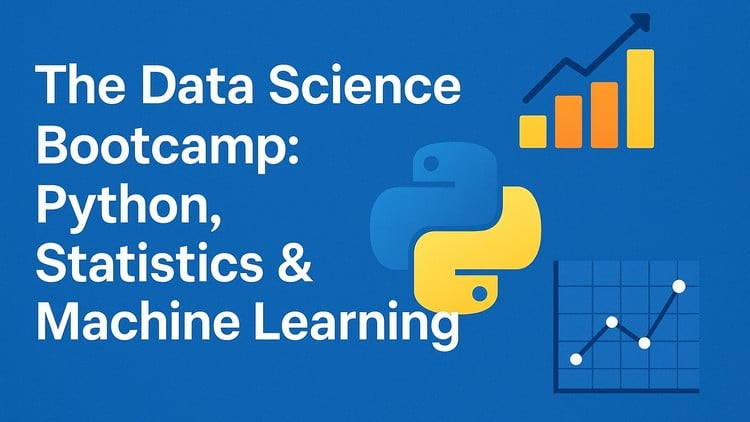
Master Data Science & Machine Learning: Python, Statistics, SQL, & Tableau for real-world projects.
👥 47 students
Add-On Information:
Note➛ Make sure your 𝐔𝐝𝐞𝐦𝐲 cart has only this course you're going to enroll it now, Remove all other courses from the 𝐔𝐝𝐞𝐦𝐲 cart before Enrolling!
-
Course Overview
- This comprehensive program, “Master Python & ML: Stats, Analysis & Data Visualization,” is designed for aspiring data scientists, machine learning engineers, and data analysts seeking mastery. It offers a robust, project-based learning experience integrating statistical foundations with practical Python, advanced machine learning, and compelling data visualization.
- Beyond theory, the course emphasizes a holistic approach, guiding learners from raw data ingestion and cleaning through statistical modeling, predictive analytics, and effective insight communication using state-of-the-art visualization tools. Participants will confidently navigate the entire data science lifecycle.
- The curriculum bridges academic understanding and real-world application, ensuring every concept is immediately actionable. Strong focus on practical implementation means students engage with diverse datasets, tackle complex problems, and develop robust, industry-ready solutions.
- Embark on an immersive journey to transform complex data into clear, actionable intelligence. This course develops a data-driven mindset, fosters critical thinking, and cultivates essential problem-solving skills for a successful career in today’s data-centric world.
- Whether enhancing existing analytical skills, transitioning into a high-demand data role, or understanding the powerful synergy between Python, ML, and data visualization, this course provides a definitive pathway to becoming a highly competent and versatile data professional.
-
Requirements / Prerequisites
- A foundational understanding of basic programming concepts, ideally with some prior Python exposure, is beneficial. Core Python essentials will be thoroughly reinforced.
- Familiarity with high school-level mathematics, including algebra and basic calculus, provides a strong base for understanding algorithms.
- No prior experience with machine learning, advanced statistics, or specific data visualization tools like SQL and Tableau is required; the course systematically guides learners from fundamentals.
- A stable internet connection, a computer capable of running Anaconda/Jupyter Notebooks, and a consistent commitment to practice are the primary non-technical prerequisites.
-
Skills Covered / Tools Used
- Python Programming Proficiency: Master intermediate to advanced Python for data manipulation, scripting, and analytical workflows, applying best practices.
- Data Structures & Algorithms in Python: Understand and apply fundamental data structures (lists, dictionaries) and efficient algorithms for data processing, crucial for optimization.
- NumPy for Numerical Computing: Gain expertise in NumPy for high-performance numerical operations, array manipulation, and vectorization, the bedrock for scientific computing.
- Pandas for Data Manipulation & Analysis: Become proficient in Pandas for powerful data cleaning, transformation, aggregation, merging, and filtering operations on structured datasets.
- Statistical Analysis & Hypothesis Testing: Deep dive into descriptive/inferential statistics, including probability, correlation, regression, A/B testing, and hypothesis testing, for sound conclusions.
- Machine Learning Fundamentals with Scikit-learn: Learn core ML concepts: supervised/unsupervised learning, model training, evaluation, cross-validation, and hyperparameter tuning, utilizing Scikit-learn.
- Predictive Modeling Techniques: Implement diverse algorithms like Linear/Logistic Regression, Decision Trees, Random Forests, SVMs, and k-Nearest Neighbors for comprehensive classification and regression.
- Data Visualization with Matplotlib & Seaborn: Create insightful static visualizations using Matplotlib and Seaborn, producing publication-quality plots (histograms, scatter plots, heatmaps) to effectively present data.
- Interactive Data Visualization with Plotly: Develop dynamic, interactive dashboards and visualizations using Plotly, enabling collaborative data exploration and deeper web-based insights.
- SQL for Database Management & Querying: Master SQL for efficient data retrieval, manipulation, and management from relational databases, a critical, industry-standard skill.
- Tableau for Business Intelligence & Dashboarding: Utilize Tableau to build professional, interactive dashboards and reports for business intelligence, transforming raw data into visually engaging insights.
- Feature Engineering & Selection: Understand techniques for creating new features, selecting optimal features, and handling missing values or outliers to significantly improve model performance.
-
Benefits / Outcomes
- Career Readiness & Portfolio Development: Graduate with a robust portfolio of real-world projects, showcasing end-to-end data science capabilities to prospective employers for highly sought-after roles.
- Data-Driven Decision Making: Cultivate the ability to interpret complex data, identify trends, predict outcomes, and translate analytical insights into strategic, data-backed decisions driving growth.
- Full-Stack Data Professional: Emerge as a versatile professional capable of handling all stages of the data science pipeline: acquisition, cleaning, advanced modeling, deployment, and insightful communication.
- Enhanced Problem-Solving Skills: Develop a critical, analytical mindset, approaching complex business problems with a structured, data-centric methodology.
- Mastery of Industry-Standard Tools: Gain hands-on proficiency with the most relevant and widely used tools and libraries in data science and machine learning, ensuring immediately applicable skills.
- Confidence in Data Communication: Learn to effectively articulate complex technical findings to diverse audiences using compelling narratives and visually engaging presentations.
- Foundation for Advanced Specializations: Build a strong theoretical and practical foundation, serving as an excellent launchpad for further specialization in areas like Deep Learning or Big Data Analytics.
-
PROS
- Comprehensive Curriculum: Covers Python fundamentals, advanced ML, statistics, SQL, and top-tier visualization, offering a holistic learning experience.
- Project-Based Learning: Emphasizes practical application through real-world projects, building a tangible portfolio and crucial problem-solving skills for industry success.
- Industry-Relevant Tools: Focuses on highly demanded tools (Python libraries, SQL, Tableau), guaranteeing immediate applicability in professional data roles.
- Strong Foundational Knowledge: Integrates statistical concepts and ML theory with practical coding, providing a deep understanding necessary for mastering data science techniques.
-
CONS
- Significant Time Commitment: The comprehensive nature and depth of topics require a substantial time investment from learners to effectively grasp material and complete assignments.
Learning Tracks: English,IT & Software,Other IT & Software
Found It Free? Share It Fast!